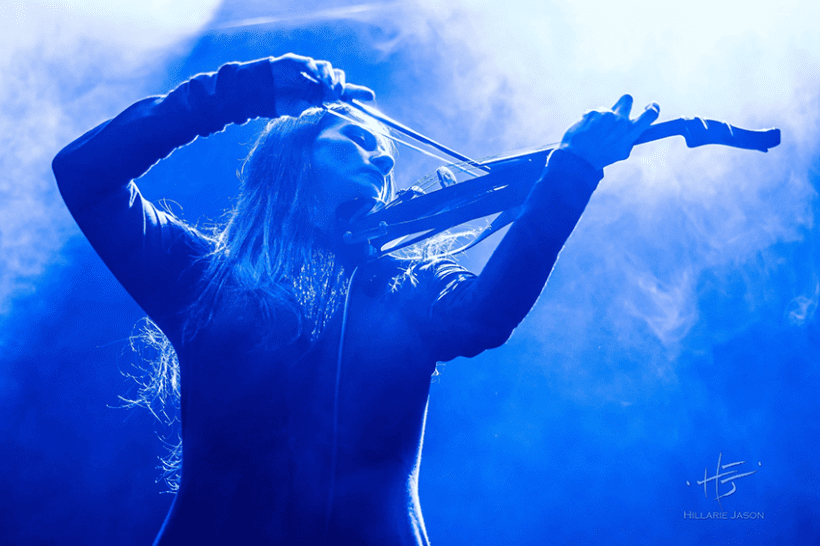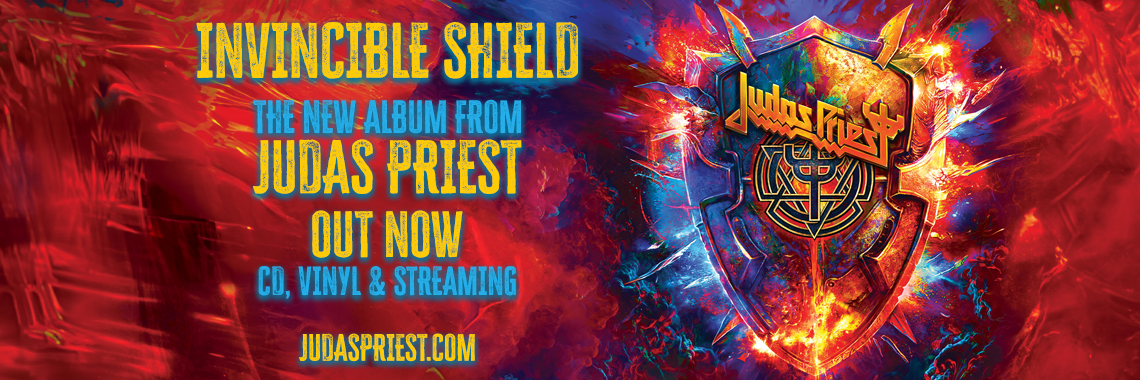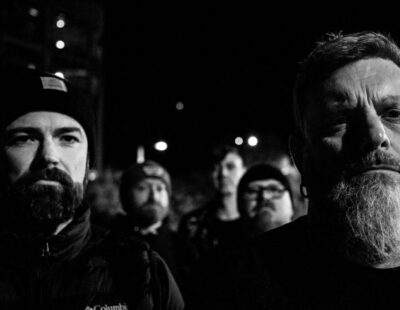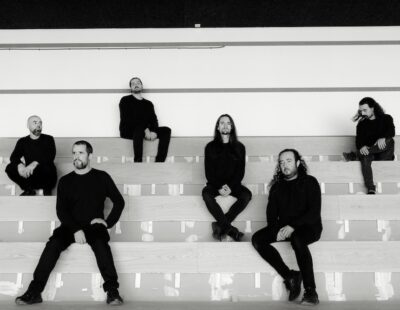
Violinist Andrea Morgan has studied her instrument since childhood in rural Oregon and became a metal fan during the anything-goes days of Internet file sharing in the early aughts. Decades later, she has gained both awareness and acceptance in the metal community thanks to her violin work for bands including The Keening, Exulansis, and even death metal bands like Mortuous.
While many classically trained musicians grow thanks to both the financial and emotional support of their parents Morgan’s classical training came as a result of her unwavering work ethic. After losing her father in middle school she took a job both to help the family and finance her musical education. Following high school she moved to Portland to study music at Portland State University; her living situation was perilously close to squatting. She has since endured job challenges and homelessness while chasing her musical dreams. Things are on the upswing: Morgan will be on at least four albums this year and will tour Europe with The Keening in early spring. She talked to Decibel about her journey.
When did you start playing the violin? Was it before you got into metal?
I grew up in southern Oregon out in the sticks and had very little exposure to the violin or any string instruments. I started when I was eleven through the string program my public school launched. They gave us a choice: We could join the orchestra or work in the kitchen (laughs). I’d only been exposed to the violin when my grandfather brought his violin to the house. My parents were kind of metalheads but more of the Van Halen type. They also liked classic rock like Led Zeppelin. I was in middle school in 2001 and my father passed away in May of that year.
What happened?
It was a car accident. I have two younger brothers; I was twelve and they were 10 and six (when the accident happened). It was a very traumatic time for the family and then 9/11 happened.
With all this happening in your young life was the instrument an escape?
There was a lot of stuff going on that I needed an escape from. I was surrounded by people who I couldn’t emotionally process things with. Playing music gave me a focus. I dug more into the violin and all the great works. I was pursuing these great works feeling all these powerful emotions from classical music but wasn’t getting an emotional outlet anywhere else. Classical music was my gateway to extreme music like black metal, death metal, and doom.
I’ve often heard that people who get very good at things do so because it stops being work. It’s fun. Was that true with you and the violin?
I was very lucky that I wasn’t forced to play an instrument. A lot of musicians I know who started at three to five had parents who drove them to practice. My pursuit was all my own. It was my choice to continue doing it. It was fun but also extremely challenging because I didn’t have a support system. I didn’t have someone telling me to practice my scales. I started working when I was 13 and was also trying to go to school and practice.
What kind of job did you have?
I worked flipping burgers and stocking shelves at a store at the California-Oregon border. It’s hard to get off the train when you get on the grind at a young age. I was in constant grind mode very early. A lot was a financial necessity – there was an urgency. I also wanted to be able to pay for my lessons. The typical violin student has their parents along at every step and their parents pay for everything. I wasn’t getting that sort of financial support because it wasn’t available. I tried to facilitate that on my own. Some of my teachers took me under their wing and helped. I knew from an early age that education and going to college would be my escape and I needed to do what I could to get myself out of there.
Dial-Up Downloading
How do you make your way from these classical masterworks to something like metal? What drew me in about metal was I felt like I could do it and it was relatable.
I had an ear for it. When I was in middle and high school we still had Kazaa. It was the beginning of Internet downloading. There wasn’t a prolific catalog of music on the Internet. People were still getting CDs, burning them, and putting them on a platform. I had a few friends who lived in town. They had fast dial-up. If my brothers and I tried to download an album it would take like three days because we were outside town. Our connection was way slower.
Downloading an album could take out your entire town’s Internet.
(laughs). When I met kids in town I was amazed they could download an album in a half hour. So that was the beginning of hearing about bands.
What bands caught your attention?
I remember hearing Xasthur, Burzum, and Leviathan – I was into depressive black metal. I didn’t know who these people were who made the music I just liked the sounds. It was a combination of things. The first LP I ever owned was Emperor. I also really loved melodic death metal and was introduced to early In Flames and At The Gates and Dissection. From there it was a bunch of recommendations: “If you like this, listen to this.”
I had friends in a band called Heathen Shrine. They were the first death metal band I ever heard and were a year older than me. The band up and moved to Portland. This group of friends was my gateway to Sleep and Neurosis and Mastodon and Origin. When I graduated high school I decided I wanted to go to music school and moved to Portland. I lived in a shitty punk house with like 13 punk rock dudes and studied classical music during the day.
So many people who get into black metal are drawn in by the stories or the outlaw element of the music. It sounds like you didn’t even know about this element – it was just the sound without a larger context.
I did find out later. When I started there was no context at all. What drew me into black metal was the sound. Krallice is one of my biggest influences; there is this agony to their sound along with fine technicality. There were things I was feeling inside and hearing this music dug into my soul. There was some agony (inside) that I couldn’t describe but when I heard the music that part of my soul lit up. Once I knew more about some of the artists it made me ask why some people experiencing such despair are also subjecting others to egregious hate.
It was easier to claim ironic distance from troubling art years ago. But when fascism and authoritarianism are on the rise globally it’s harder to justify it.
I don’t know a single metal musician who hasn’t listened to a sketchy band. It was part of my musical education. Things are very different now than they were 15 or 20 years ago. (In the past) people used symbols to provoke people or elicit a certain reaction. It was considered acceptable because it was art and artists were trying to get others to think. Nowadays we need to make a choice. You can’t walk the fence. Artists now have to be very steadfast in what they believe.
Studying Music
When you are living in the punk house how did you take your instrument and become part of the metal scene?
It took a while. When I moved to Portland I wasn’t even trying to join bands. I focused on learning my instrument because I had a spotty education growing up. I had a lot of work to do to catch up with my colleagues and had to learn theory and do sight singing and ear training. It wasn’t until after college that I started joining bands. I didn’t feel there was a place for me as a violinist in any band.
Even two decades ago there was no precedent for the kind of things you are doing.
The first band I joined after college was Megaton Leviathan. It was a psychedelic doom project. I was experimenting at that point. As I worked with more musicians I learned it was my job to translate their musical language. I’m not there to educate people about reading treble clef. I am there to translate someone’s musical language. It wasn’t until around 2017 when I was asked to join Exulansis. It was an experiment at first. I do remember seeing SubRosa and thinking they were doing the things I wanted to do. I wanted to incorporate my violin into metal music in a way that wasn’t gimmicky.
And years down the road you end up in the band with Rebecca (Vernon, chief songwriter for both SubRosa and The Keening).
I never thought that would happen (laughs).
Do people give you sheet music? Do you get songs in the works? How do people work with a violinist in heavy music?
It depends on the person. Sometimes people have prewritten parts and want to do it verbatim. Sometimes people tell me to do whatever I want on top of it. With Exulansis there is no sheet music. We have a primary songwriter but we all collaborate on the arrangements and piece together what we’re going to do. It’s often me reacting to what is written. In The Keening Rebecca had all these parts written but didn’t have sheet music. Some of the songs have like five layers of violin or viola. With the amount of layers, I did write out the notes and the bowing patterns for when I recorded. I am grateful for my musical education because I can communicate with musicians from all walks of life. The results are usually pretty seamless when we get in the zone.
What is it like to work with Rebecca?
When we first started working together we’d only met barely a few years before. (The Keening drummer) Nate Carson was helping bring in session musicians for Little Bird. I was honored to be asked to do it and was trying to get the parts perfect. But I was nervous. I didn’t know how she was going to be so I was trying to be as professional as possible and straightlaced. When I got to the studio she was the sweetest person and so receptive.
I’ve never even heard her use a bad word.
(laughs). Very rarely. I don’t think that is part of her regular vocabulary. What I love about her is she is genuinely inquisitive. She has a journalist mentality. When she talks to someone you are the only person on the planet and she wants to know every detail about you. Everyone in this project is in it because we love her. She has this abundance of love for life and learning. She just wants to evoke emotion with music and help people feel something. There is nothing I want more than to help her facilitate that.
Losing A Home
Is your primary job teaching? Making ends meet with music is hard even when you get good gigs. How are you making this work?
It’s been a challenging time for the last year or so. During the pandemic, I went back to school to get my K-12 credential. But it burned me out on teaching. Because of the workload in grad school, I couldn’t keep up with my expenses. This resulted in losing my housing. For the end of 2022 and the first half of 2023, I was totally displaced and living on couches and crashing with friends or going home to stay with my Mom. I was floating around trying to get back on my feet.
At the same time, these wonderful things were happening musically. The experience made me realize I needed to use music in the way I always wanted. Right now I am working in venues in and around Portland and getting back into private teaching. At the caliber I want to play music and violin, I can’t do it and teach in a public school full time.
What is next for you?
There are some big tours. I helped put out five albums in 2023. It sounds like there are going to be four or five coming out this year. I’m just going to keep plugging. I want to play out more and that is the trajectory I am on. I hope I can continue collaborating with other bands and I’m open to anyone reaching out wanting to collaborate.







